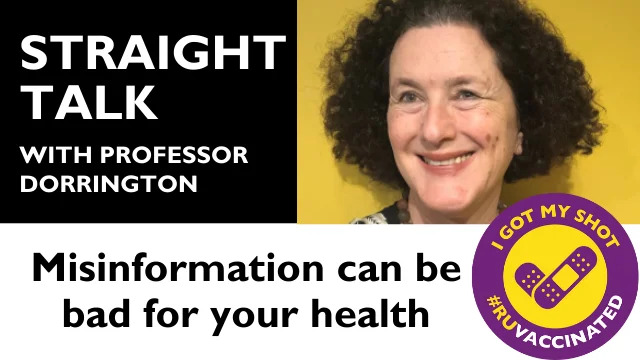Rhodes University virologist and member of the Provincial COVID-19 Expert Panel, Professor ROSEMARY DORRINGTON, addresses some of the myths and misinformation currently in circulation about the COVID-19 vaccines.
There is an ever-increasing number of myths and misinformation doing the rounds, and I am here to set some of the facts straight. Let’s take some of the most common concerns and dig a little deeper into each one.
1. The vaccine will not prevent me from dying – FALSE
There have been “breakthrough cases” where vaccinated people contract COVID-19. However, even with the Delta variant, vaccinated people are nine times less likely to get infected, and most of these infections result in asymptomatic or mild illness. The vaccines are more than 90% effective at preventing severe illness and even more effective at preventing deaths from COVID-19. There have been a small number of deaths, though. The evidence is that these were vaccinated people with serious co-morbidities or immunocompromised, so they did not develop a strong enough response to the vaccine.
And remember, breakthrough cases do not refer to people “dying from the vaccine” as it is sometimes misrepresented in the media and social media. Breakthrough cases refer to vaccinated people who get infected. And 90% of these infections cause asymptomatic or mild illness.
2. The vaccines inject you with the virus – FALSE
The vaccines we are using in South Africa right now do not contain the SARS-CoV-2 virus. They only contain a small part of the spike protein – one of 25 proteins produced by the virus – that stimulates your immune system to make antibodies to fight off future infection. The Pfizer COVID-19 vaccine presents the cell with instructions (mRNA) to produce a part of the spike protein that will build immunity. Over the past 200 years, vaccines have reduced the morbidity and mortality of infectious diseases such as smallpox, poliomyelitis, hepatitis B, measles, tetanus, whooping cough and more recently, Ebola and Zika across the world.
3. The vaccine alters your DNA – FALSE
The Pfizer vaccine contains mRNA, which is short-lived and does not alter the DNA of human cells. This mRNA contains the instructions to make only the coronavirus spike protein, and it cannot move from one cell to another. Also, it cannot get into the cell nucleus, which is where the DNA is, and therefore it can’t interact with the DNA. I like to think of the vaccine as an email message to your immune system that gets deleted after the cell has read it.
4. The vaccine can make your infertile – FALSE
With more than 2 billion people already vaccinated worldwide, there is no clinical evidence that the COVID vaccines affects fertility. Vaccine monitoring has historically shown that side effects generally happen within six weeks of receiving a vaccine dose. Millions of people have received COVID-19 vaccines, and no negative long-term side effects have been detected, including fertility. Studies showed an equal number of people becoming pregnant in the vaccinated and unvaccinated groups.
In fact, a recent report using the v-safe safety monitoring system data showed that 4,800 people had a positive pregnancy test after receiving the first dose of an mRNA COVID-19 vaccine (i.e., Pfizer).
Globally, we continue to monitor the safety of COVID-19 vaccines closely. If scientists find a connection between a safety issue and a vaccine, the regulators and the vaccine manufacturers will work toward an appropriate solution to address the specific safety concern.
5. The vaccine was approved under emergency conditions and is therefore not safe – FALSE
Vaccines undergo rigorous trials to ensure they are safe and effective. All vaccines undergo a comprehensive approval process by medical regulators to ensure that they are safe, even when approved under emergency conditions.
The fast development and approval of vaccines is an extraordinary feat brought about by sharing vital information between scientists and pharmaceutical companies. This achievement is indeed worthy of celebration. This has also been possible because we have learned how to make and test vaccines over many decades, and we were able to take those lessons and challenge ourselves to produce a vaccine much quicker.
While the specific COVID vaccine is relatively new, the technology (method for delivering the spike protein) it uses is well-established with over 10 years of testing. So, the “vehicle” is well-tested, and it’s only the “cargo” that has changed.
The Pfizer vaccine was recently fully approved by the FDA and is no longer considered an “emergency” vaccine.
Sources:
https://sacoronavirus.co.za/2021/07/23/presentation-covid-19-vaccines-chasing-a-virus-to-control-the-pandemic-professor-glenda-gray/
https://www.dailymaverick.co.za/article/2021-08-10-vaccine-denialism-kills-mail-guardian-has-badly-let-down-its-readers/
https://www.cdc.gov/coronavirus/2019-ncov/vaccines/safety/vsafepregnancyregistry.html
Source: Rhodes University Communications


